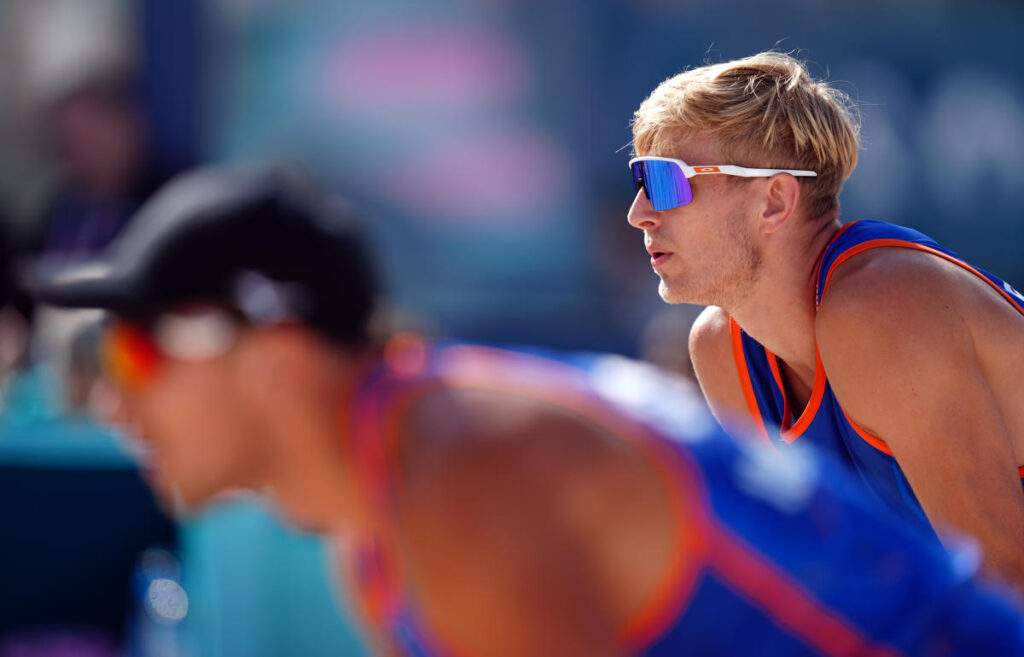As a skilled reporter for Media Talk Africa, I would convert the provided HTML code into a well-structured and easy-to-read article. Here’s the rewritten article:
Convicted Child Rapist Plays in Olympics, Sparks Outrage
PARIS — The convicted child rapist playing beach volleyball for the Netherlands received a mixed response before his Olympic debut.
Steven van de Velde, 29, drew mostly muted applause on Sunday when he and his partner emerged from the Eiffel Tower Stadium tunnel and walked across the sand for the first time. Boos and whistles were far more audible when the stadium PA announcer introduced van de Velde before the match, but those were soon replaced by cheers from orange-clad Dutch fans once the match against an Italian team got underway.
The response wasn’t so gentle from the international media horde that came to Sunday’s match. A few dozen reporters from at least eight different countries made a beeline to the mixed zone after the deciding third set where they waited to see if the Dutch would follow through with their pre-match plan not to allow van de Velde to speak to the media.
Van de Velde indeed did not show, leaving his partner Matthew Immers and Dutch National Olympic Committee press officer John van Vliet to face a barrage of tough questions. A British reporter even asked van Vliet if van de Velde’s unwillingness to speak with the media made him “a coward as well as a child rapist.”
Immers told reporters that he was “disappointed” by all the focus on van de Velde’s past conviction, particularly after their “hard fight” to qualify for the Olympics. Van Vliet defended the Dutch’s decision to honor van de Velde’s request to stay in a hotel rather than at the Olympic Village and to allow him to skip out on post-match mixed zone interviews.
“We are protecting a convicted child rapist to do his sport as best as possible for a tournament in which he qualified for,” van Vliet said.
Van de Velde’s Conviction
The firestorm of controversy surrounding van de Velde stems from an incident that took place almost a decade ago. In August 2014, when he was 19, van de Velde flew to England to meet a 12-year-old girl who he had befriended after she began following him on Facebook. The victim told her parents she was staying with a friend and snuck out to try to book a hotel room with van de Velde in her hometown a little over an hour’s drive north of London.
Van de Velde knew how young she was when they drank Bailey’s Irish Cream together. He knew how young she was when they slept on cardboard boxes under a hotel stairway after they couldn’t get a room. He knew how young she was when they had several sexual encounters.
Before he returned to the Netherlands, van de Velde advised the victim to get the morning-after pill because they had not used contraception. Staff at a family planning clinic alerted the victim’s family and the police because of her age.
At his 2016 sentencing hearing, van de Velde wept when he learned the victim had experienced guilt and had been self-harming, the Milton Keynes Citizen reported. Judge Francis Sheridan issued a scathing rebuke, telling van de Velde that “the emotional harm that has been caused to this child is enormous” and that “as she matures she will have to come to realize that you are not the nice man she thought you were.”
“That prediction hasn’t held up as time has passed. Van de Velde only served 13 months of his four-year prison sentence. Twelve of those months came in England. He then was transferred back home to the Netherlands and released after a month as a result of the country’s more lenient laws concerning statutory rape,” the article states.
Victim Advocacy Groups Call for Van de Velde to Withdraw
The response has been different across Europe and beyond since van de Velde and Immers qualified for the Olympics. International media outlets have shined a spotlight on van de Velde’s disturbing history, social media users have expressed outrage over his inclusion on the Dutch Olympic team, and sexual assault victim advocacy groups have called for him to withdraw from Paris 2024 or face a ban.
“His participation sends a message to everyone that sporting prowess trumps crime,” said Kate Seary, co-founder and director of UK-based Kyniska Advocacy.
An open letter from The Brave Movement earlier this month said, “There is still time for Van de Velde to withdraw. There is still time for the Dutch Olympic Association, NOC*NSF, to withdraw him. We believe that is the only appropriate action.”
When asked what his message would be to survivors of sex crimes, van Vliet said he had “no message.”
“We respect every opinion on this matter,” he said.
Van Vliet and Immers both said the Dutch have been surprised by the response to van de Velde playing in the Olympics after so many years without complaints.
“In general, sex-related crimes are definitely a much bigger issue than sport,” van Vliet said, “but in his case we have a person who has been convicted, who did his sentence and who did everything afterward that he could do to be able to compete again.”
